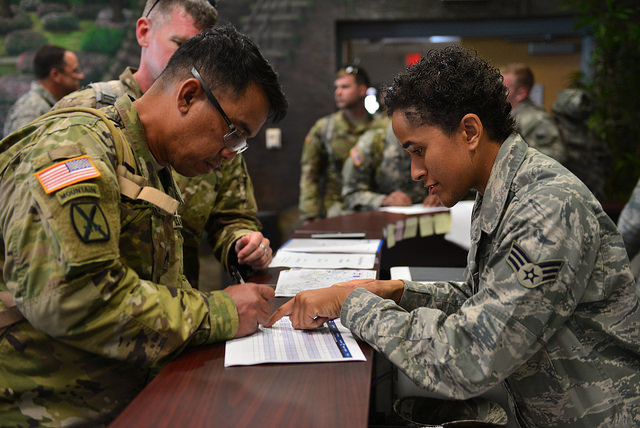![]() When you are ready to connect with resources on your base or in your local community, you can use Safe Helpline’s comprehensive database of military and civilian sexual assault service providers to find what you are looking for.
When you are ready to connect with resources on your base or in your local community, you can use Safe Helpline’s comprehensive database of military and civilian sexual assault service providers to find what you are looking for.

You can access the complete database three ways:
Online: Search the full database with your base/installation name, zip code, state or country here.
Text message: Simply text your base/installation name, zip code, state, or country; the type of resource you are looking for; and what Service you are with to 55-247 (inside the U.S.) or +1 571-470-5546 (outside the U.S.). Text STOP to cancel. Message & data rates may apply. Texting Terms of Service.
Safe Helpline app: Download the app to your mobile iOS or Android device and search the database anytime you have Internet access.
The database includes contact information for the following:
- Sexual Assault Response Coordinators (SARCs)
- SAPR Victim Advocates (VAs)
- Medical and mental health service providers
- Special Victims’ Counsel or Victims’ Legal Counsel
- Chaplains
- Civilian sexual assault service providers
- Military Police
You can also access Transitioning Service Member resources online here as well as via Text (same numbers as above) and the Safe Helpline app.
How can accessing services near me help?
It can be helpful to have support in your own community after sexual assault. Both military and civilian resources have highly trained staff who can offer assistance in moments of crisis as well as resources for ongoing support related to sexual assault. They can offer information and support including:
- Assisting a survivor with making an official report
- Physical and psychological support
- Medical attention and hospital accompaniment
- Legal/criminal justice system advocacy
- Help with safety planning, including Military Protective Orders and Civilian Protective Orders
What are Sexual Assault Response Coordinators (SARCs) and Sexual Assault Prevention and Response Victim Advocates (SAPR VAs)?
SARCs are a confidential resource who ensure that you receive appropriate and responsive care. SARCs manage an installation or unit’s Sexual Assault Prevention and Response (SAPR) program and serve as the single point of contact to coordinate care. While the SARC primarily provides management and oversight of SAPR services, SAPR VAs can provide you with direct assistance and help you navigate the military’s response system. This can include accompanying you to the hospital and throughout the investigative and judicial process.
SARCs and SAPR VAs are trained to listen and respond to your needs. If you request additional or ongoing support, they can connect you with appropriate resources, including medical care, mental health care, legal advice, spiritual support, and additional command support, if needed. They can support you in decision-making and ensure that you are not alone as you navigate the process of reporting a sexual assault.
care, mental health care, legal advice, spiritual support, and additional command support, if needed. They can support you in decision-making and ensure that you are not alone as you navigate the process of reporting a sexual assault.
Both SARCs and SAPR VAs can take both Restricted and Unrestricted Reports. If you file an Unrestricted Report, which will lead to a criminal investigation, the SARC will also keep you up-to-date on the progress of your case. For more information about the different reporting options, please click here.
Are there other resources on-base I can also connect to?
SARCs and SAPR VAs are the core of the military sexual assault response system, but there are a number of other responders that are available to help meet your needs. Responders may include medical and mental health personnel, chaplains, legal personnel, military police, and commanders. To learn more about the role of each responder, read below.
What are Healthcare Personnel?
Medical and mental health services providers are healthcare professionals who provide medical and mental health care services at military medical treatment facilities.
Physicians, physician assistants, and nurses all contribute to treating injuries and managing the risk of sexually transmitted infections. Specially trained nurses called Sexual Assault Medical Forensic Examiners (SAMFE) provide medical care and gather forensic evidence during a Sexual Assault Forensic Examination (SAFE). Learn more about a SAFE here.
Psychologists, psychiatrists, psychotherapists, social workers, counselors, and other mental health service providers can help you manage your feelings, build resiliency, and address other issues related to sexual assault that you may be experiencing.
Mandatory Reporting Laws and Healthcare Personnel:
Some states have mandatory reporting laws that specifically include adult survivors of sexual assault. However, these laws are preempted for military Service members by a Federal law which prohibits reporting the survivor’s or the accused’s personally identifying information to local and state law enforcement. This means that if you are accessing medical care in a state that requires healthcare personnel to report cases of adult sexual assault, your right to a Restricted Report will still be protected. If you have any questions or concerns regarding your state’s mandatory reporting laws, contact your SARC or SAPR VA first.
What are Military Chaplains?
Military chaplains provide spiritual advice and counseling on religion, ethics, and morale of assigned personnel. Communication with a Chaplain is privileged, which means they are prohibited from sharing the information with anyone, and therefore they may be an additional confidential resource for you.
Although a Chaplain is unable to take a Restricted or Unrestricted report, they can offer support and help you connect with your local SARC or SAPR VA if you wish to make an official report.
What are Legal Personnel?
It is important to note that not all Judge Advocates are confidential resources. For example, if you are a victim of sexual assault, the information provided to a JA other than your Special Victims’ Counsel or Victims’ Legal Counsel could trigger an Unrestricted Report.
- Judge Advocates (JAs) are military legal counsel responsible for legal matters for each Military Service. JAs are attorneys who have graduated from an accredited law school, are licensed to practice law by the highest court of a state or by a federal court, and have graduated from the Military Legal School. Judge Advocates include:
- Special Victims’ Counsel (SVC)/ Victims’ Legal Counsel (VLC) – are attorneys designated specifically for you and can provide legal advice and guidance, while maintaining your confidentiality throughout the military justice process.
- Prosecutor/Trial Counsel – works to prepare and prosecute the case at court-martial.
- Defense Counsel – defend the suspect.
- Staff Judge Advocate (SJA) – works for the commander to provide legal advice and guidance on legal matters within the command.
What is a Special Victims’ Counsel/Victims’ Legal Counsel?
A Special Victims’ Counsel/Victims’ Legal Counsel is an active duty Judge Advocate whose sole role is to represent survivors of sexual assault in a confidential, attorney-client relationship, throughout the investigation and prosecution process. They provide a safe place for you to discuss your concerns and receive information about the rights and protections afforded to you under the law throughout the military justice process. They are not the same as a prosecution or defense counsel.
Special Victims’ Counsel (SVC) is the term used by the Army, Air Force, Coast Guard, and National Guard.
Victims’ Legal Counsel (VLC) is the term used by the Navy and Marines.
Find more information about SVC/VLC program and Service-specific definitions here.
What are Military Police?
Each of the Military Services has their own Military Police Force, commonly known as Military Police in the Army and Marine Corps, Masters at Arms in the Navy, and Security Forces in the Air Force. They all operate under their respective Provost Marshall and will typically investigate crimes against persons and property that are not handled by the Military Criminal Investigative Organizations (MCIO), (i.e., Army Criminal Investigation Division (CID), Naval Criminal Investigative Service (NCIS), Air Force Office of Special Investigations (OSI), The U.S. Coast Guard Investigative Service (CGIS)).
Unrestricted reports of sexual assault offenses must be referred to an MCIO for an investigation. Only an MCIO is authorized by policy to interview a survivor of sexual assault, and you can have an SVC/VLC or a SARC/SAPR VA with you for support during the interview.
Other typical military police officer duties may include conducting policing activities, corrections and detention operations, police and criminal intelligence operations as well as combat support operations, area security, stability and civil support operations.
What are civilian sexual assault service providers?
There are more than 1,000 local sexual assault service providers across the country that work with the Rape, Abuse & Incest National Network (RAINN) to help survivors of sexual violence in their communities. All RAINN affiliates operate 24/7 crisis telephone hotlines and must provide services without discrimination.
Although the services provided vary by the affiliate, they generally offer a wide variety of specialized services. Many centers provide individual counseling options, group counseling or support groups, legal and medical advocacy and crime victim assistance. Some may also offer emergency shelter or have connections to other organizations that do.
What are some additional resources that may be available to me?
Vet Centers Directory
Vet Centers offer community-based counseling and other services to eligible active-duty Service members and Veterans. To find your closest Vet Center, click here.
Family Advocacy Program
The Family Advocacy Program, or FAP, is the Department of Defense program designated to address domestic abuse, child abuse and neglect, and problematic sexual behavior in children and youth. FAP services are available at every military installation where families are assigned. Locate FAP Victim Advocates and other domestic abuse resources on and off-installation with the Victim Advocate Locator – whether you’re in the United States or overseas. Click here.
Civilian Legal Resources
VA and civilian legal resources are available to Service members affected by Sexual Assault. For more information on the resources available, click here.


